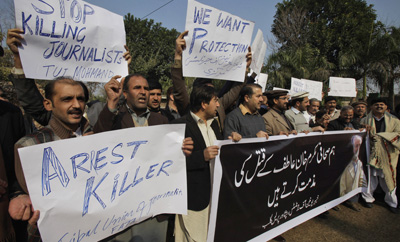Pakistani journalists are under threat, and the public is paying the price. The most recent report from the Human Rights Commission of Pakistan includes a detailed chapter on freedom of expression, which ties growing suppression to rising incidence of violence and threats against news media. Not coincidentally, Pakistan sits near the top of CPJ’s Impunity Index and other the global lists of most dangerous countries for reporters.
• CPJ’s 2012
Impunity Index
Threats to journalists in Pakistan are no longer confined to the border, the Federally Administered Tribal Areas, or Baluchistan. Reporters working in urban centers such as Islamabad, Peshawar, Quetta, Karachi, and Lahore regularly receive threats. They must be taken seriously, given that so many Pakistani journalists have died with hardly any of their deaths being investigated.
And we are seeing a new trend: Journalists working for international news agencies have become targets of threats. The pressure on them has mounted as militant groups grow more sophisticated in their approach to media. Instead of worrying only about reports in the vernacular press, these militants closely monitor international media as well. They know full well which Pakistanis are responsible for unfavorable coverage in wire services, influential foreign newspapers, magazines, and broadcasters. Local journalists coming under threat is nothing new in Pakistan, but for the first time we are starting to see journalists leaving their jobs at international media outlets due to fears for their safety.
With 32 years of experience as a journalist, I see increasingly difficult days ahead. Perhaps the worst evolution is in Karachi, which is different in some ways from other conflict areas. Pakistan’s largest city has become a hotbed for militants. It is the country’s biggest media center with head offices of most of the large media outlets, including broadcasters. The companies controlling cable distribution, while not media producers themselves, face threats and pressure for the content they distribute, which they often pass on to the broadcaster themselves. Cable wires have been cut as broadcasters such as the powerful Geo group have been attacked. And it is not uncommon for copies of newspapers to be torched. Though their leaders deny it, hardcore activists from groups like the Awami National Party and the Muttahida Qaumi Movement have been accused of being behind much of the violence.
Across Pakistan in the last few years there have been number of incidents in which local stringers, many of them photojournalists, face simultaneous threats from militants and government intelligence agencies. Some journalists, incredibly, have been detained by officials after being held hostage by militants. The militants feel many local journalists are informants. Government agents are concerned about close ties between journalists and the militant groups they have to report on. With nowhere to turn, local journalists suffer from all sides while their enemies go unpunished.
The situation in Pakistan is very bad, but the issue of impunity is global. My deepest hope is that the United Nations will take up the issue of violence against journalists. I firmly believe that under the Universal Declaration of Human Rights it is the U.N.’s responsibility to take measures to protect my Pakistani colleagues as well of those of our colleagues around the world.
